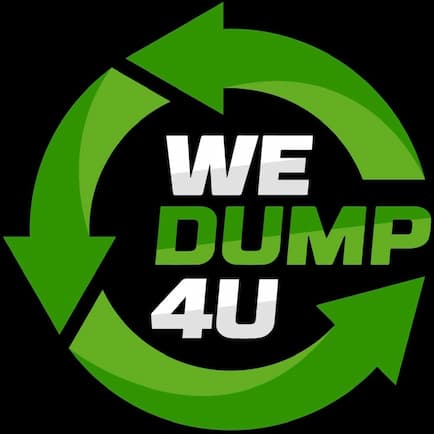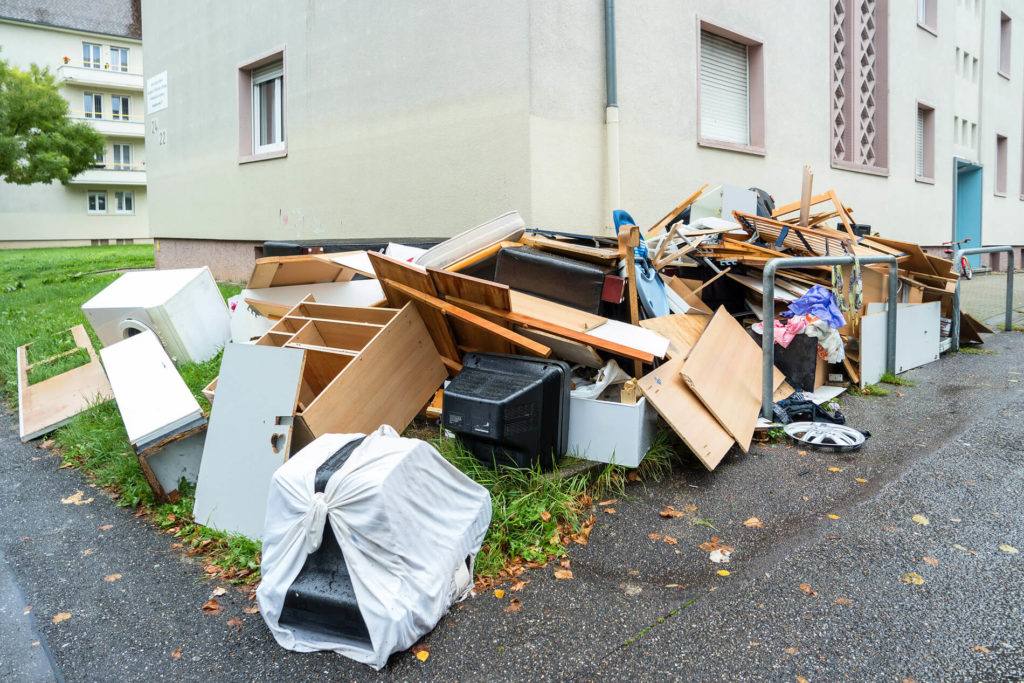If you’ve ever faced a mountain of plasterboard offcuts, rubble from a kitchen refit, or garden renovation debris, you’ll know that deciding whether to hire a skip or make a trip to the local recycling centre can be confusing. The landscape has recently changed. As of 1 January 2024, the UK Government abolished fees for many types of DIY waste at Household Waste Recycling Centres (HWRCs).
We’ll walk you through the Devon HWRC rules, how the 2024 policy affects Plymouth recycling centre DIY waste, what you need in terms of proof of address or van permit, and a handy flowchart to help you decide whether you can take certain waste to the HWRC or whether you should hire a skip.
Why the 2024 Rule Change Matters
What Changed?
Before 2024, many councils charged for accepting DIY waste—plasterboard, rubble, concrete, etc.—at their HWRCs. These charges could run to £10 per item in some areas (see Gov.UK). The change now means that councils must treat light DIY waste like general household waste when certain conditions are met.
Put simply:
- Households no longer pay fees for small-scale DIY waste under specific amounts.
- If the materials you bring to the HWRC exceed those limits, or exceed your free allowance of visits/bags, charges or restrictions may still apply. See Devon.Gov for more info.
This is a major win for homeowners doing refurbishments, as it removes a barrier to responsible disposal and helps discourage fly-tipping.
Devon HWRC Rules: What You Need to Know
Free DIY Waste in Devon
Devon County Council states that small amounts of DIY waste will be accepted free of charge at its recycling centres under the new rule. Devon County Council Their policy indicates some limits will still apply — e.g., for “excess DIY waste” or oversize materials. Devon County Council
Restrictions & Limits
Because the policy is intended for small-scale DIY waste, here are typical boundaries:
- There may be a limit on how many visits per month you can make for free DIY waste.
- Larger or unusual items (heavy slabs, roofing materials, or site waste) may still require charges or special permits.
- Some HWRCs may ask you to book your visit, especially for materials like rubble and plasterboard.
Always check your local council or Devon’s recycling centre policies before heading out.
What the HWRCs Still Charge For
Even with the free DIY change, some materials or exceptions may still incur fees:
- Items beyond your free allowance of visits or volume
- Oversized building components
- Trade or commercial waste
- Hazardous materials (asbestos, certain chemicals)
- Use of van or trailer in some centres may require permits (see Plymouth section)
Devon’s recycling centre policy mentions that a “limited free allowance” of DIY waste is available per household, and that excess or oversize material may still trigger charges. Devon County Council Also, some of Devon’s individual centres (e.g. Totnes) list chargeable waste categories even as DIY changes take effect. Devon County Council
Plymouth Recycling Centres & DIY Waste Policy
Centres & Basic Rules
Plymouth City Council operates two main recycling centres: Chelson Meadow (Plymstock) and Weston Mill. Plymouth City Council To use them, you must provide proof of your Plymouth address (e.g. council tax bill, utility bill, driving licence).
Chelson Meadow in particular lists DIY materials—rubble, plasterboard, ceramics—as accepted items if you meet certain conditions. They define conditions such as:
- You must live at the property doing the DIY work
- You have not paid for construction, demolition or preparatory work
- You bring fewer than two 50-litre bags or equivalent
- A single article of waste must be under dimensions (e.g. 2000 mm × 750 mm × 700 mm)
- You are limited to 4 DIY waste visits in a 4-week period without charge.
If you exceed those conditions (e.g. more visits or larger amounts), a charge will apply.
Van & Trailer Permits
At Chelson Meadow, if you bring a van or trailer, you may require a permit. This policy ensures centres are not overwhelmed or misused by commercial waste. Always check ahead whether your vehicle class qualifies or whether you need a permit.
Items Accepted and Not Accepted at Plymouth’s Recycling Centres
Plymouth’s recycling centres accept a wide range:
- General household waste
- Bulky waste (sofas, mattresses, furniture)
- Wood, metal, garden waste
- Small and large electrical items
- Plasterboard, rubble, ceramics, glass
- Chemicals, batteries, paints, engine oil, gas bottles
- Hazardous items in some controlled form
However, despite the DIY waste rule change, if you bring large commercial loads, or exceed allowed volumes, or improperly packaged hazardous waste, you may still face refusal or charges.
Flowchart: HWRC vs Skip Hire — What to Do with Your DIY Waste
Here’s a simple path to guide your decision:
- What’s the volume & type?
- Small DIY waste (under two 50L bags, under size limits)? → Follow HWRC rules
- Lots of rubble, heavy materials, or many items? → Likely skip or private removal
- Is your vehicle allowed?
- Personal car/estate? → Probably no permit required
- Van or trailer? → Check if HWRC needs permit
- Have you already made 4 free visits in past 4 weeks?
- No → Use free DIY allowance
- Yes → Additional items may cost or need skip
- Does local HWRC accept this item?
- Yes (plasterboard, tiles, rubble) → Bring it in
- No / special / hazardous → Consider skip hire or licensed waste removal
- Which is more efficient?
- If waste is bulky or you’re doing lots of jobs, hire a skip might be faster, more convenient, and safer than multiple trips
- For minor jobs, HWRC is cost-free and locally accessible
Examples: What Used to Cost & What’s Free Now
| Item | Before 2024 Fee | Post-2024 Status | Notes |
|---|---|---|---|
| Plasterboard sheet or panel | Up to £6 / sheet in some areas letsrecycle.com | Free if under size/volume limits via HWRC | Chelson Meadow accepts small plasterboard loads under conditions |
| Rubble / hardcore / soil | £2.40 per 25–50L bag in Plymouth area letsrecycle.com | Free within household allowance under new rule | Larger volumes or commercial jobs may still incur charge |
| Tiles, ceramics | Charged in many areas | Free under DIY exemptions | These are now treated like household waste when within limits |
| Oversized or multiple bin bags | Fee applied | May still be charged, or need skip | HWRCs will refuse or charge for excessive amounts |
Because of the 2024 change, thousands of homeowners saving £10 or more per item is realistic.
Best Practices & Tips for Devon & Plymouth Residents
- Always check your local council’s HWRC page before visiting — policies or hours may change.
- Book in advance if required (some centres now require booking for DIY waste visits).
- Measure your waste in bag equivalents or dimensions to avoid surprises.
- Bring proof of address (council tax, utility bill, driving licence) when using Plymouth centres. Plymouth City Council
- Check vehicle limitations: some HWRCs do not accept vans or trailers without permits.
- Avoid treating HWRC as free skip service — avoid overusing free visits, because charges or refusals may return if abused.
- For large or heavy jobs, hire a skip or licensed waste removal company — less strain, legal compliance, and less risk of refusal.
- Reuse or donate salvageable materials before disposing — local charities or reuse shops may take usable fixtures, tiles, timber.
Key Considerations When Removing Waste in Plymouth
- The 2024 rule change abolished fees for small DIY waste at HWRCs, meaning Devon HWRCs and Plymouth recycling centres now accept many DIY materials free within defined limits.
- You still need to follow local HWRC rules, including permit requirements or volume limits, especially in Plymouth (Chelson Meadow & Weston Mill)
- Not all waste qualifies — if your project generates heavy or large quantities beyond the allowance, skip hire or professional waste removal remains the safer, more practical path.
- Use the flowchart above to decide when to take your waste to an HWRC, and when to hire a skip.
By understanding the new rules, making sure your vehicle and items comply, and using strategic judgement, you can dispose of your DIY waste legally, cost-free (in many cases), and responsibly.


